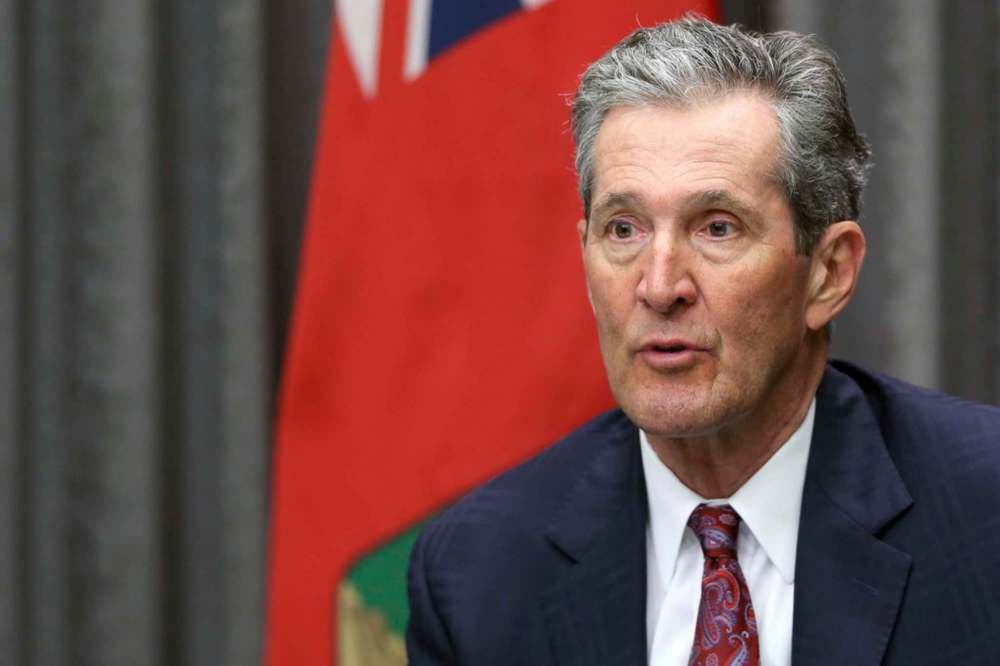Premier defends decision to turf school trustees
Advertisement
Read this article for free:
or
Already have an account? Log in here »
To continue reading, please subscribe:
Monthly Digital Subscription
$0 for the first 4 weeks*
- Enjoy unlimited reading on winnipegfreepress.com
- Read the E-Edition, our digital replica newspaper
- Access News Break, our award-winning app
- Play interactive puzzles
*No charge for 4 weeks then price increases to the regular rate of $19.00 plus GST every four weeks. Offer available to new and qualified returning subscribers only. Cancel any time.
Monthly Digital Subscription
$4.75/week*
- Enjoy unlimited reading on winnipegfreepress.com
- Read the E-Edition, our digital replica newspaper
- Access News Break, our award-winning app
- Play interactive puzzles
*Billed as $19 plus GST every four weeks. Cancel any time.
To continue reading, please subscribe:
Add Free Press access to your Brandon Sun subscription for only an additional
$1 for the first 4 weeks*
*Your next subscription payment will increase by $1.00 and you will be charged $16.99 plus GST for four weeks. After four weeks, your payment will increase to $23.99 plus GST every four weeks.
Read unlimited articles for free today:
or
Already have an account? Log in here »
Hey there, time traveller!
This article was published 16/03/2021 (1731 days ago), so information in it may no longer be current.
Premier Brian Pallister argued the removal of elected trustees will make the Manitoba public school system more accountable, as he defended his government’s proposed reforms.
The Education Modernization Act (Bill 64) was introduced in November, but not unveiled until Monday, as the province also released its long-awaited kindergarten to Grade 12 education review.
The proposed bill excludes one significant recommendation of the Progressive Conservative government-commissioned review, by getting rid of elected school trustees altogether and replacing them with government appointees.

“The recommendation wasn’t to keep all elected trustees — it was to have some appointed and some elected,” Pallister said at a Tuesday news conference. “Upon review, we made the decision, given that we were taking 80 per cent of the responsibilities of trustees away.”
The provincial government had announced earlier it is phasing out the property education tax and changing how public schools are funded.
“The negotiation, the tax-setting responsibilities are the lion’s share of what trustees do,” Pallister said. “They won’t be doing that going forward, so there wasn’t the need to keep trustees.
“The model is to put power down to the parent councils. Community education councils will have much more power, much more responsibility. Principals will be educational leaders now,” the premier said.
“When a parent has a problem with their child in school, they don’t go to a trustee. They don’t go to a superintendent — not with great frequency. They go to a teacher,” said Pallister, who reminded reporters he and his mother were both teachers.
“We want to empower teachers and parents to have that relationship.”
The province expects $40 million in savings will be redirected to classrooms when 37 public school boards are replaced by a single education authority.
Pallister couldn’t say how many jobs will be lost. Staff at all the school division offices forced to close will “get first option at getting government jobs in their region that become available, in their skill set.”
“We understand there will be impacts, because there’s a lot of top-heaviness in our education system,” said Pallister.
In 2019, Statistics Canada reported school board administrative costs in Manitoba, on average, accounted for 3.13 per cent of board spending. In Ontario, it accounted for 2.1 per cent; Saskatchewan spent 2.2 per cent on administrative costs; the Canadian average was 2.5 per cent.
“Those savings are going to the front line to help our children, our teachers, our students and our schools,” said Pallister.
On Tuesday, Opposition NDP Leader Wab Kinew said creating an education authority — a “huge new bureaucracy” — won’t lead to any savings redirected to the so-called front lines.
“It’s sort of like a Shared Health of education, when the real demands are for us to make sure every kid in Manitoba has an equal chance at succeeding in education by ensuring we’re doing everything we can to mitigate child poverty,” Kinew told reporters.
Meanwhile, Pallister said parents need to get involved, and outlined the role school community councils will play in decision making.
“They will be responsible for assessing the effectiveness of programming at the school. They will analyze the student achievement learning outcomes. They’ll determine the areas of focused improvement. The principal must be accountable to them,” the premier said.
“The need to evaluate the performance of any person employed at that school will be within the advisory powers of the community councils. Capital construction projects — when they’re proposed at the school site — they’ll get to overview those. They’ll get to see the proposed annual budget. They’ll get to see the monthly expenditures.”
On Monday, NDP MLA Lisa Naylor (Wolseley), a former Winnipeg School Division trustee, said she fears the most marginalized students will be left further behind by an education authority made up of government appointees.
“From watching the pandemic, this government can’t be trusted to stand up for the most marginalized, to make decisions for people who are really suffering.”
carol.sanders@freepress.mb.ca

Our newsroom depends on a growing audience of readers to power our journalism. If you are not a paid reader, please consider becoming a subscriber.
Our newsroom depends on its audience of readers to power our journalism. Thank you for your support.



